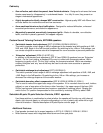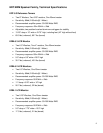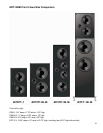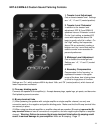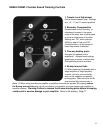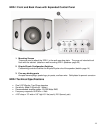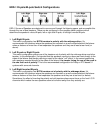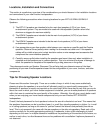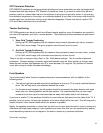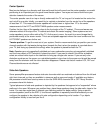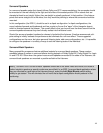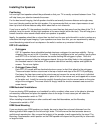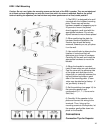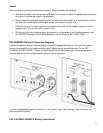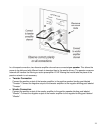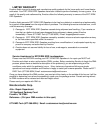16
CRT Television Distortion
ERT/ERM/ERD speakers are not magnetically shielded and many subwoofers are also not magnetically
shielded and thus may distort a CRT television if placed too close. If you want to check if this will be a
problem, select an unused video input on the television to bring up a single color screen. If you see any
color distortion anywhere on the screen, an unshielded speaker is too close to the screen and should be
moved away from the television until the color distortion disappears. Please note that all modern LCD,
DLP and Plasma televisions are not affected.
Tweeter Positioning
ERT/ERM speakers can be set up with two different tweeter positions, since the tweeters are located to
one side of the speaker, and not in a central position. The positioning of these tweeters can alter sound
imaging.
1. ‘Near Field’ Tweeter Positioning
Setting up ERT/ERM speakers with the tweeters facing inwards (towards each other), creates a
‘Near Field’ sound image. This gives a tighter, more focused ‘on axis’ sound.
2. ‘Far Field’ Tweeter Positioning
Setting up ERT/ERM speakers with the tweeters facing outwards (away from each other), creates
a ‘Far Field’ sound image, with a broader more spacious ‘off axis’ sound.
There is no right or wrong to using ‘Near’ or ‘Far’ Field tweeter settings. This is a matter of personal
preference. Common settings, however, might tend towards using the ‘Near’ position in a larger room,
when the main left and right speakers are 15 or more feet apart, or using the ‘Far’ position in a smaller
room, when trying to create a broader soundstage.
Front Speakers
You should closely follow Emotiva’s speaker placement recommendations with the addition of the
following points:
• The left and right front speakers should be positioned so that your TV is exactly centered between
them. This will help focus your attention towards the screen.
• For the best overall imaging, the left speaker should be set exactly the same distance and angle
away from your listening position as the right speaker. It is recommended that you use a tape
measure to set them up to be the same distance away within about half an inch tolerance.
If you have a smaller TV, the speakers should be no more than two feet away from the sides of the TV. If
possible, have the center, left and right speakers at the same height (within two feet). This will help give a
smooth transition when sound effects move from speaker to speaker.
Ideally, the speakers should be no closer than two feet from the rear and side walls in order to reduce any
reflections that might upset imaging. If your speakers are closer than this, you can experiment by adding
sound deadening material such as drapes on the walls to reduce any unwanted reflections.
(Continued, next page)



